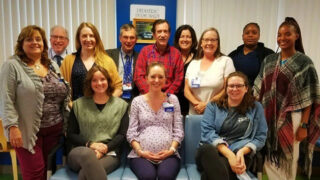Cystic Fibrosis
Top-Level Care for Patients of All Ages
Albany Medical Center is one of approximately 130 specialized Cystic Fibrosis Care Centers across the country accredited by the Cystic Fibrosis Foundation. When the pediatric center opened more than 60 years ago, it was one of only two in the nation.
The Cystic Fibrosis Foundation has been the driving force behind research over the last several decades that has dramatically improved the quality and length of life in patients with cystic fibrosis. The model of care involves an entire team approach—a physician, a nurse, a dietitian, a social worker, and a respiratory therapist who see patients regularly. For our younger patients, this team also works closely with the pediatric specialists of the Bernard & Millie Duker Children's Hospital who specialize in the care of infants and teenagers with cystic fibrosis.
Albany Medical Center's Pediatric Pulmonary and Cystic Fibrosis Center sees patients up to 18 years old for consultations and follow-up care, and also offers pulmonary function testing, including spirometry, lung volumes and diffusion testing. To make an appointment, call 518-262-6880.
Albany Medical Center's adult Cystic Fibrosis Care Center, located within our Pulmonary clinic, sees patients 18 years and older for consultations, follow-up care, pulmonary function testing, and more. A dedicated cystic fibrosis clinic is held on Wednesday mornings. We also participate in many research studies and clinical trials. To learn more or make an appointment, call 518-262-5196.
Cystic fibrosis (CF) is inherited, which means the disease is passed from parents to children. Cystic fibrosis is caused by mutations in a single gene that produces the cystic fibrosis transmembrane conductance regulator (CFTR) protein. In people with CF, mutations in the CFTR gene can disrupt the normal production or functioning of the CFTR protein found in the cells of the lungs and other parts of the body.
Cystic fibrosis is a recessive disease. A person must have a mutation in both copies of the CFTR gene to have CF. This means if a child inherits a faulty CFTR gene from each parent, they will have CF. The mapping of the human genome in the past 20 years has enhanced our understanding of the gene mutations responsible for CF and has advanced research.
Learn more about CF genetics from the Cystic Fibrosis Foundation.
Symptoms of cystic fibrosis vary from person to person and may change over time. One of the first signs or symptoms of cystic fibrosis is that a child’s sweat may taste very salty. However, respiratory symptoms are the most common signs of CF. These may include frequent coughing, thick mucus, sinusitis, bronchitis, and pneumonia. Digestive symptoms may include diarrhea, constipation, and stomach pain and discomfort.
In New York State, cystic fibrosis is tested for as part of mandatory, routine newborn screening. If cystic fibrosis is detected, our physicians will evaluate your child and work with you on a lifelong care plan. Therapy is tailored to each patients and is aimed at preventing and controlling lung infections, reducing the amount of mucus production, preventing and treating intestinal blockages, and preventing dehydration. There are medications that can further control the disease.
Other tests to diagnose cystic fibrosis are a sweat test and a blood test to look for mutations in the CF gene. Commercially available genetic/ancestral tests also can detect mutations in the CF gene using a saliva sample. Testing also may include chest or sinus X-rays and lung function tests. In addition, because cystic fibrosis can affect the reproductive system, an evaluation for cystic fibrosis is often done as part of a fertility evaluation.
Clinical research is a key endeavor at our center. Affiliated with the CFF’s Therapeutics Development Network, the largest CF clinical trials network in the world, Albany Medical Center’s researchers actively participate in clinical studies to evaluate the safety and effectiveness of new CF therapies.
In recent years, clinical research has led to the introduction of medications that can partially modify or repair the effects of genetic defects in CF patients, increasing the average life expectancy from 25 years to 40 years. Now, with newborn screening, infants with the CF gene can be treated very early in life.


